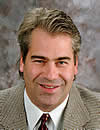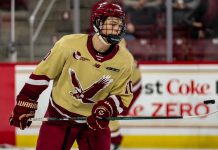John Hill more or less said things will be different at Alaska-Anchorage.

The former Minnesota assistant coach got right to work on Tuesday, the day he agreed to a three-year deal to coach the Seawolves. He said he starting thinking immediately of what needed to be done before the 2001-2002 season begins.
He had time Tuesday for a question-and-answer session with U.S. College Hockey Online, from his hotel room in Marco Island, Fla., where the WCHA is holding its offseason meetings.
He knows that under former coach Dean Talafous, Anchorage was known for playing a conservative style.
“We’re not going to be conservative,” Hill said.
The text of the interview follows:
Q: Can you express your feelings right now?
A: I don’t know if it’s really sunk in yet. I accepted the job this afternoon, and right away I started thinking about all the things I’ve got to do. I feel like there’s a lot of work that needs to be done right now. I need to, well, heck I’ve got to get up there and sit down and meet with the kids individually and get them squared away for the summer. For me, the most pressing issue right now is recruiting, and I’ve got to be on the phone an awful lot in the next few days and couple weeks to try to get that shored up.
I’m happy to have the opportunity to go back to the University of Alaska-Anchorage. I played there from ’80 to ’84 and I’m very passionate about it. I’ve been in the league now as an assistant at UAA and Colorado College and Minnesota, and I had hoped that the opportunity would come about for me one day. Now that it has, I’m happy and I’m proud to be going back.
Q: What’s it going to be like for you in the next couple of weeks, dealing with recruits?
A: Right now they’ve got two kids committed: Lee Green, a defenseman from Alaska who plays for the Omaha Lancers in the USHL; and Ryan Young, a right winger who plays for the Lincoln Stars, and Ryan’s from Anchorage. I know both Lee and Ryan, I watched them play when they were young kids, and I know them both personally. I guess I’m fortunate in that regard that I know those two young fellows already. What I’m going to have to do is try to plug some holes, and obviously it’s a late date to get started trying to do that.
The most important thing, I think, is to get up there and talk to the kids that are coming back and find out what they think their strengths are. I know what Lee and Ryan can do, I know what they bring to the table. I’m trying to get a feel for the kids that are returning and the two that are coming in … and try to base the remaining recruits on what we have and what I feel we need.
Q: Speaking of recruiting, will being in Minnesota for a couple of years be an advantage to you in getting some of those players, who would have gone to Minnesota or St. Cloud State, to come to Anchorage?
A: To be honest with you, I don’t think any of the kids from Minnesota right now would look at Alaska-Anchorage over the schools in the area. There’s some kids I’d like to touch base with. I think those kids are always going to want to go to the schools that are closer to home and the schools that they’ve got more recognition with.
I’m going to talk to some kids that played in the USHL, from other states, and I’m going to talk to some kids from western Canada.
Q: Do you also hope to keep the kids from Anchorage at UAA as opposed to going somewhere else or to major juniors?
A: I think for the program to be successful up there, it’s very important that the top Alaskan kids stay home. If you can do that, you’re going to have a chance to be real competitive and maybe make some noise once in a while. I think if we fail to do that, it’s going to be a struggle.
— Alaska-Anchorage coach John Hill
The top priority for me is going back home and establishing a relationship with the coaches, and I know all of them, and then the kids up there — getting a feel for the talent we have up there, and then establish a relationship with them and their families.
Q: Do you see yourself bringing in a new style, one different than the one former coach Dean Talafous employed?
A: I know the kind of hockey I like to play, and I know the kind of hockey I like to watch on TV. And I know the kind of hockey I like to coach. The last six years, at Colorado College and Minnesota, we played an up-tempo, puck-possession game based on speed and guys with stick skills. That’s what I hope our hockey team will resemble when we start play next October, and I know it’s the kind of kids we’re going to try to recruit.
I want to play up-tempo hockey, I want to give the kids the green light when they’ve got the puck. Obviously, that doesn’t mean running around and getting caught out of position when you don’t have it, but I want to put pressure on the puck to try to create turnovers. I hope we can recruit kids with speed and skill and play an exciting brand of hockey up there because I think that’s what people want to see.
Q: Do you hope that will free up some of the current players to take more chances, where in recent years they’ve been thinking more defensively?
A: I hope it will. I told the kids when I was up for my interview that I’m a real believer in playing puck-possession hockey. I believe in giving kids the green light. You’re going to make mistakes, and sometimes it’s going to result in turnovers, but I want them to play with confidence when the puck’s on their stick. I told them that every time they step on the ice, they’re trying to score goals, and that’s how you win hockey games.
I’m going to give them the freedom and I’m going to encourage them to go with the puck when we’ve got it, and we’ll see what happens from there. I’m familiar with some of the kids because I watched them in the USHL. I know they’ve had a conservative style, but we’re not going to be conservative.
Q: You mentioned your interview. Part of that was an open house with the public. What was that like for you?
A: I was fortunate because I grew up in Anchorage, played and coached there. So I knew the majority of the people who attended both of those sessions, so I was very comfortable. I will say this: If I was going into a situation where I didn’t know anyone, it may have been a little unnerving. For me, I was comfortable with everybody in the situation so it didn’t bother me one bit.
I actually looked forward to it because I wanted to express to people the type of hockey I wanted to play and the type of person that I am and the coach that I hope to be.
Q: You’ve been in the WCHA more than 10 years total, starting as a player. How’s that going to help you, knowing the personalities and the teams you’re going to be going up against?
A: I certainly know the personnel on the opposing teams, and I know the style that all the coaches like to play. So I think those things can only help you because you’ve got a certain level of confidence in those areas. But you still have to get on the ice and get your team prepared and hope that they execute.
Like I said, there’s a level of comfort, but at the same time I have a great deal of respect for our league and the coaches in our league. So there’s quite a challenge preparing to beat them.


